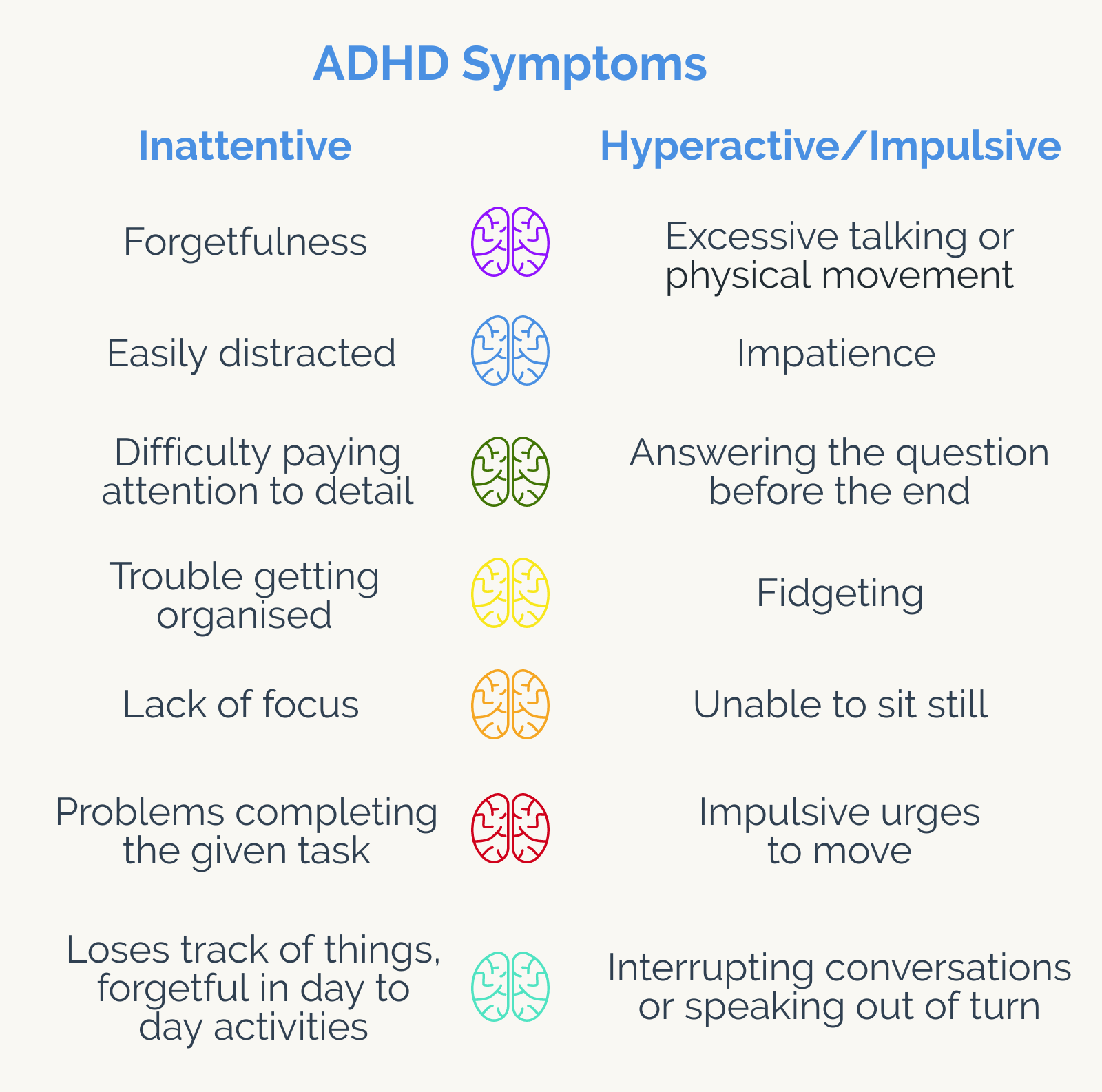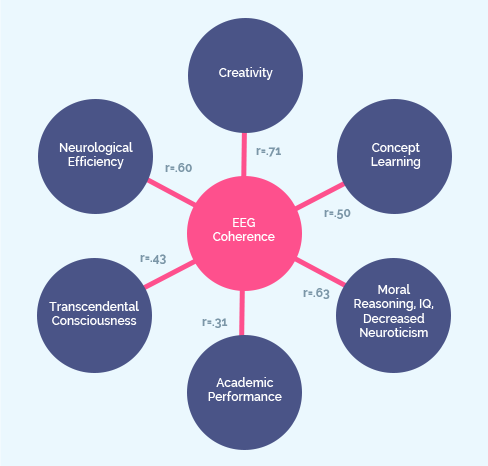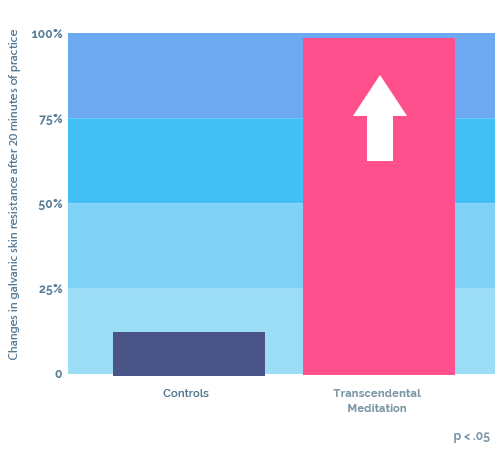Alexander C. N. and Gackenbach J. Transcendental Meditation and improved performance on intelligence-related measures: A longitudinal study. Personality and Individual Differences, 12, 1105–1116, 1991.
Aron A., et al. The Transcendental Meditation program in the college curriculum: A 4-year longitudinal study of effects on cognitive and affective functioning. College Student Journal 15: 140-146, 1981.
Cranson R.W., et al. Transcendental Meditation and improved performance on intelligence-related measures: A longitudinal study. Personality and Individual Differences 12: 1105-1116, 1991.
Cranson R.W., et al. Transcendental Meditation and improved performance on intelligence-related measures: A longitudinal study. Personality and Individual Differences 12: 1105-1116, 1991.
Dillbeck M.C. Meditation and flexibility of visual perception and verbal problem-solving. Memory & Cognition 10: 207-215, 1982.
Dillbeck M.C., et al. Longitudinal effects of the Transcendental Meditation and TM-Sidhi program on cognitive ability and cognitive style. Perceptual and Motor Skills 62: 731-738, 1986.
Jedrczak A., et al. The TM-Sidhi programme, age, and brief test of perceptual-motor speed and nonverbal intelligence. Journal of Clinical Psychology 42: 161-164, 1986.
Jedrczak, A., et al. The TM-Sidhi programme, pure consciousness, creativity and intelligence. The Journal of Creative Behavior 19: 270-275, 1985.
Tjoa A. Increased intelligence and reduced neuroticism through the Transcendental Meditation program. Gedrag: Tijdschrift voor Psychologie 3: 167-182, 1975.
Barnes V.A., et al. Impact of stress reduction on negative school behavior in adolescents. Health and Quality of Life Outcomes 1:10, 2003.
Eyerman J. Transcendental Meditation and mental retardation. Journal of Clinical Psychiatry 42: 35-36, 1981
Arenander A. and Travis F.T. Brain patterns of Self-awareness. In B Beitman and J Nair, Eds. Self-Awareness Deficits. New York: W.W.Norton, 2004.
Goddard P.H. Reduced age-related declines of P300 latency in elderly practicing Transcendental Meditation. Psychophysiology 26: 529, 1989.
Lyubimov N.N. Electrophysiological characteristics of mobilization of hidden brain reserves. Abstracts, the International Symposium "Physiological and Biochemical Basis of Brain Activity" (St. Petersburg, Russia: Russian Academy of Science, Institute of the Human Brain): 5, 1994.
Mason L. I., et al. Electrophysiological correlates of higher states of consciousness during sleep in long-term practitioners of the Transcendental Meditation program. Sleep 20 (2): 102-110, 1997.
Nidich S.I., et al. Kohlbergian cosmic perspective responses, EEG coherence, and the Transcendental Meditation and TM-Sidhi program. Journal of Moral Education 12: 166-173, 1983.
Orme-Johnson D.W. and Haynes C.T. EEG phase coherence, pure consciousness, creativity, and TM-Sidhi experiences. International Journal of Neuroscience 13: 211–217, 1981.
Travis F. Eyes open and TM EEG patterns after one and after eight years of TM practice. Psychophysiology 28 (3a): S58, 1991.
Travis F. and Miskov S. P300 latency and amplitude during eyes-closed rest and Transcendental Meditation practice. Psychophysiology 31: S67 (Abstract), 1994.
Wallace R.K., et al. Modification of the paired H reflex through the Transcendental Meditation and TM-Sidhi program. Experimental Neurology 79: 77-86, 1983.
Dillbeck M.C. and Orme-Johnson D. W. Physiological differences between Transcendental Meditation and rest. American Psychologist 42:879–881, 1987.
Jevning R., et al. The physiology of meditation: a review. A wakeful hypometabolic integrated response. Neuroscience & Biobehavioral Reviews 16(3):415-24, 1992.
Jevning R., et al. The transcendental meditation technique, adrenocortical activity, and implications for stress. Experientia 34(5):618-9, May 15, 1978.
Orme-Johnson D.W. Autonomic stability and Transcendental Meditation. Psychosomatic Medicine 35, 341-349, 1973.
Orme-Johnson D.W. and Walton K. W. All approaches of preventing or reversing effects of stress are not the same. American Journal of Health Promotion 12:297-299, 1998.
Subrahmanyam S. and Porkodi K. Neurohumoral correlates of Transcendental Meditation. Journal of Biomedicine 1: 73–88, 1980.
Walton K.G., et al. Lowering cortisol and CVD risk in postmenopausal women: a pilot study using the Transcendental Meditation program. Annals of New York Academy of Sciences 1032:211-215, 2005.
Brooks J.S. and Scarano T. Transcendental Meditation in the treatment of post-Vietnam adjustment. Journal of Counseling and Development 64: 212-215, 1985.
Gaylord C., et al. The effects of the Transcendental Meditation technique and progressive muscle relaxation on EEG coherence, stress reactivity, and mental health in black adults. International Journal of Neuroscience 46: 77-86, 1989.
Orme-Johnson D.W. Autonomic stability and Transcendental Meditation. Psychosomatic Medicine 35: 341-349, 1973.
Alexander C.N., et al. Transcendental consciousness: a fourth state of consciousness beyond sleep, dreaming, and waking. in J. Gackenbach (ed.), Sleep and Dreams: A Sourcebook, New York: Garland Publishing, Inc., 282–315, 1986.
Alexander C.N., et al. Growth of higher stages of consciousness: Maharishi's Vedic psychology of human development. in Charles N. Alexander and Ellen J. Langer (eds.), Higher Stages of Human Development: Perspectives on Adult Growth. New York: Oxford University Press (1990).
Alexander C. N., et al. Major issues in the exploration of adult growth. In C. N. Alexander and E. J. Langer (Eds.), Higher stages of human development: Perspectives on adult growth (p. 3-32). New York: Oxford University Press, 1990.
Alexander C. N., et al. Advanced human development in the Vedic Psychology of Maharishi Mahesh Yogi: Theory and research. In M. E. Miller and S. R. Cook-Greuter (Eds.), Transcendence and mature thought in adulthood: The further reaches of adult development (pp. 39-70). Lanham, MD: Rowman & Littlefield, 1994.
Alexander C.N., et al. Effect of Practice of The Children's Transcendental Meditation Technique on Cognitive Stage Development: Acquisition And Consolidation of Conservation, Journal of Social Behavior and Personality, 17, 21-46, 2005.
Alexander C.N., et al. Transcendental Meditation, self-actualization, and psychological health: A conceptual overview and statistical meta-analysis. Journal of Social Behavior and Personality 6: 189-247, 1991.
Chandler H.M., et al. Transcendental Meditation and postconventional self-development: A 10-year longitudinal study. Journal of Social Behavior and Personality, 17(1), 93–121, 2005.
Gelderloos P. Cognitive orientation toward positive values in advanced participants of the TM and TM-Sidhi program. Perceptual and Motor Skills 64: 1003-1012, 1987.
Gelderloos P. Field independence of students at Maharishi School of the Age of Enlightenment and a Montessori school. Perceptual and Motor Skills 65: 613-614, 1987.
Gelderloos P. and Beto, Z. H. A. D. The Transcendental Meditation and TM-Sidhi program and reported experiences of transcendental consciousness. Psychologia—An International Journal of Psychology in the Orient 32(2): 91–103, 1989.
Gelderloos P., et al. Field independence of students at Maharishi School of the Age of Enlightenment and a Montessori school. Perceptual and Motor Skills 65: 613–614, 1987.
Gelderloos P., et al. Transcendence and psychological health: studies with long-term participants of the Transcendental Meditation and TM-Sidhi program. Journal of Psychology 124(2), 177–197, 1990.
Pelletier K.R. Influence of Transcendental Meditation upon autokinetic perception. Perceptual and Motor Skills 39: 1031-1034, 1974.
Seeman W., et al. Influence of Transcendental Meditation on a measure of self-actualization. Journal of Counseling Psychology 19: 184-187, 1972. Reduced Stress
Dillbeck M.C. and Orme-Johnson D. W. Physiological differences between Transcendental Meditation and rest. American Psychologist 42:879–881, 1987.
Jevning R., et al. The physiology of meditation: a review. A wakeful hypometabolic integrated response. Neuroscience & Biobehavioral Reviews 16(3):415-24, 1992.
Jevning R., et al. The transcendental meditation technique, adrenocortical activity, and implications for stress. Experientia 34(5):618-9, May 15, 1978.
Orme-Johnson D.W. Autonomic stability and Transcendental Meditation. Psychosomatic Medicine 35, 341-349, 1973.
Orme-Johnson D.W. and Walton K. W. All approaches of preventing or reversing effects of stress are not the same. American Journal of Health Promotion 12:297-299, 1998.
Schneider R.H. Altered responses of cortisol, GH, TSH and testosterone to acute stress after four months' practice of Transcendental Meditation (TM). Annals of the New York Academy of Sciences 746:381-384, 1994.
Subrahmanyam S. and Porkodi K. Neurohumoral correlates of Transcendental Meditation. Journal of Biomedicine 1: 73–88, 1980.
Walton K.G., et al. Lowering cortisol and CVD risk in postmenopausal women: a pilot study using the Transcendental Meditation program. Annals of New York Academy of Sciences 1032:211-215, 2005. Improved School Behavior.
Barnes V.A., et al. Impact of stress reduction on negative school behavior in adolescents. Health and Quality of Life Outcomes 1:10, 2003.
Fergusson L.F., et al. Personality and health characteristics of Cambodian undergraduates: A case for student development. Journal of Instructional Psychology 22: 308-319, 1995.





